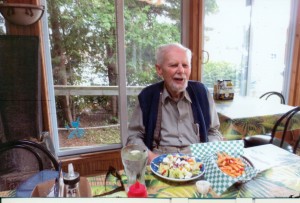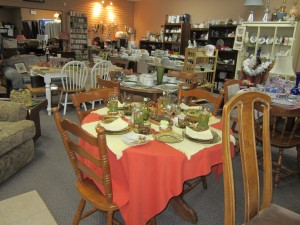The story below was written by John Wiens.
I had seen glimpses of him at the Leamington Mennonite Seniors Home and when I briefly spoke to him he told me that his wife Margie of sixty-six years, was now a resident in the home. Harry Riediger himself, was not able, at the age of eighty-eight to be her care giver any more. Although Margie, physically still seemed to be doing quite well, dementia had advanced to a stage where she now needed the constant care that the home was able to provide.
Sometime in May, my wife Edith and I had been to Harrow. We drove into town, looking for the Full Circle thrift shop at 57 King Street; it was not there. It was completely gone. Instead the vacant area of its prior location was surrounded by wire barriers with heavy construction equipment parked behind it. Inquiring about its fate, I was told by one of the construction workers that the thrift shop was still around and that its new location was in the back, behind the TD Bank at 39 King Street East Rear. To get there we would have to weave our way through a maze of wire barriers and a back alley, and that the store was in a corrugated tin warehouse type building. As we drove on, winding our way between the barriers and back alley, we finally recognized it by the Mennonite Central Committee (MCC) logo at the second door on the outside wall.
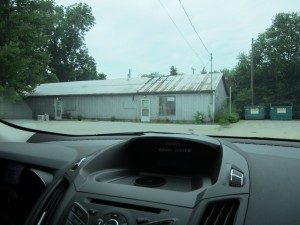
Walking in, Edith and I recognized friendly familiar faces, Alma Lepp, Gertrude Riediger and others. Some of them customers. If our first impressions were that this was a terrible setup for a thrift store to do a thriving business — we were wrong. We were told that business in fact, was better than ever.
The fact is, thrift stores are bargain stores. That’s where bargain hunters can make the best deals that they may have ever made. True bargain hunters don’t trust glitzy stores on Main Street. They like business establishments in back alleys. Places that are difficult to find. A real bargain is a purchase of an item that has a story with it of intrigue, of history and adventure, and may even have hints of being a rare antique. Also, a recycled item, environmentally, is a more correct purchase than a brand new purchase. Above all, an item purchased in a charitable thrift store has a special blessing with it. It is a product that has the blessing of its donor, the volunteer store workers and the purchaser. How can you go wrong with a purchase made in a charitable thrift store?
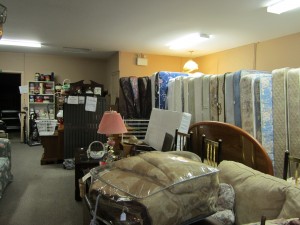
I asked about Harry Riediger. Yes, he was in the back room somewhere making repairs on something. He was glad to see me, but he was busy and did not have much time for me. Someone was sitting in a pickup truck outside and waiting for him to make some deliveries. However, when I asked Harry about “Harry’s Farm” he said he had sold it several years back, “but it’s still there.” Before leaving I told him “Harry I’ll be back again when you have more time.”
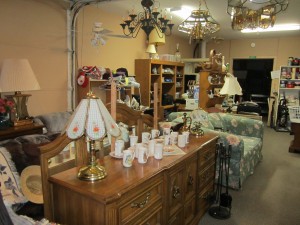
Several weeks later I again, one morning called him on the phone. “Harry would you have some time for me today?”
He hesitated. “Well, I am going out to pick up a couch.”
“Harry, how about if I come at 11:30 and take you out for lunch?”
“Oh, yah that would be OK.” He told me that he lived in one of the houses in “Harrowood.” You will recognize my place. It’s the one with the open garage door.”
As Edith and I again wound our way through the maze of construction barriers and back alley, the Full Circle Shop was closed. On the door; a notice “Open 1.00 pm. to 5.00 pm.” We did not know where Harrowood was. I asked a man on the sidewalk where Harry Riediger lived. Yes he knew. “Turn south by the Funeral Home, go on to Pollard, turn left. You’ll see Harrowood. Everybody in Harrow knows Harry Riediger.” We found the housing unit with the open garage door cluttered with all kinds of discarded miscellaneous items.
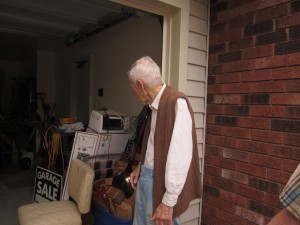
I knocked on the door, eventually he came out. After greeting us, he said he had dozed off after the furniture pickup they had made that morning. He asked us in. His house was neat and clean, he said a cleaning lady came in to keep it that way. We noticed some very beautiful French provincial furniture, he said was Margie’s. Then there were a few more tattered items — those he said were his.
We drove back into town. Harry’s favourite restaurant, “The Drifter’s Inn,” an old converted residential house on King Street. The waitress opened the door for us. She was glad to see Harry who introduced us to Sherry. The waitress invited us into a bright airy sunroom with tables and chairs. We ordered sandwiches and fries that Harry claimed were “the best in town.”
After lunch, we brought Edith back to the Full Circle Store. Harry and I drove back to the 3rd Concession and to what at one time was “Harry’s Farm.”
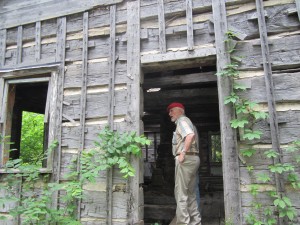
The place looked very abandoned.
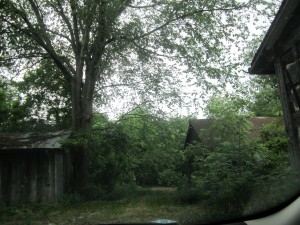
The grass on what Harry claimed to be the driveway was higher than my vehicle. We drove in part of the way and got out of the vehicle. The mosquitoes were bad. The buildings were still all there, but completely over grown just as everything else seemed to be on the rest of the property.

The main building, the old log house, the windows and door had been removed and the inside stripped of its rough-sawn chestnut boards from the walls and floors by its succeeding owners after Harry had sold it to them. The old square axe hewn log house had been stripped of its former glory days — of a time when it had reminded me of the “Possum Lodge” on CBC’s “Red Green” sitcom. A time when Harry’s friends would bring their unwanted treasures, leave them with him, come in to sit around a warm stove and outdo each other, stringing tall tales. Observing Harry, I noticed by his somber facial expressions that he was having some melancholy feelings reliving past experiences. He told me that he had really enjoyed this place and some of the best times of his life had been right here.
Those times are gone, but Harry, now at the age of eighty-eight is still involved in junk — I mean in the recycling business. He is still giving “retirement” a bad name. Although he does not have a driver’s license anymore, he still has a pick-up truck. Harry teamed up with a friend, Robert (Bob) Waters, who also lives nearby in the same senior housing complex. Bob has no pick-up truck, but still has a driver’s license. Together they’re a team. Their volunteer efforts, as always are all for charity.
After I had interviewed Harry in 2002 and introduced him at the Historical Association banquet, he began to toy with the idea that maybe he did not have to bring his donations to Leamington. If there was a thrift store in Harrow they could stay and be sold right there. After all, he already was selling a lot of items on his own in Harrow, off his “Farm”. Also the Etcetera Shop did not have a specific appointed manager, but rather volunteer day managers. Some of them self-appointed, and some that seemed to complain when Harry came with his “stuff”. He would have to figure out the days when certain, more friendly managers would be on duty at the store.
Some volunteers can sometimes be difficult to work with. I can remember a time when I was in charge of a volunteer project. I was having some difficulties with one of them and when I confronted him, his answer was, “John, you are not my boss.” When I asked him ‘Well, just who do you think is your boss?” His answer: God. What could I say? His boss certainly was a very much higher authority than I was.
So in 2005, Harry rented a building on Walker Road off King and opened his own store. One day a lady walked in and spent some time in the store. She was a lady with a minor handicap. Her name was Marba Clark. She offered her voluntary services to Harry and that she would like to assist him; helping him to mind the store. Harry told me she was totally trust worthy and did a very fine job of managing. Also he had recruited another new partner; Herman Lepp. Harry’s Farm had been sold and Herman had a nice two car garage that now would serve as a storage and repair shop. Herman and Alma’s car would have to stand outside. Herman was of great help to Harry. The two of them made a great team until tragedy struck. Herman was diagnosed with a deadly cancer, and after a time of illness, succumbed to it. When the shop got too small, Harry rented a second small shop across the street on Walker Road. It served as a kind of drop-off warehouse that was always open. A place where people could leave their discarded treasures. Sometimes cluttering the sidewalk. That shop front has now received a coat of orange paint and is the local office for the NDP political party.
Then in 2006, Harry’s daughter-in-law Betty and their pastor, Greg Yanzy, convinced Harry to have a giant yard sale of all his inventory at the Harrow Mennonite Church, and to use the proceeds to open a new store at 57 King Street, the main street in Harrow. Harry’s son Richard is the manager. Of course the building at that address has now been demolished and the Full Circle Thrift Store relocated to the back alley behind the TD Bank at 39 King Street E. Rear.
Harry himself is still as busy as ever and still giving retirement a bad name.
When I told Harry’s story to Bruno Penner, he seemed very interested and suggested to me that we drive to Harrow and pay our friend Harry another visit. Harry was glad to see us and filled us in further on some of Bruno’s queries. We also drove to Harry’s abandoned farm where Bruno took a number of photos.
